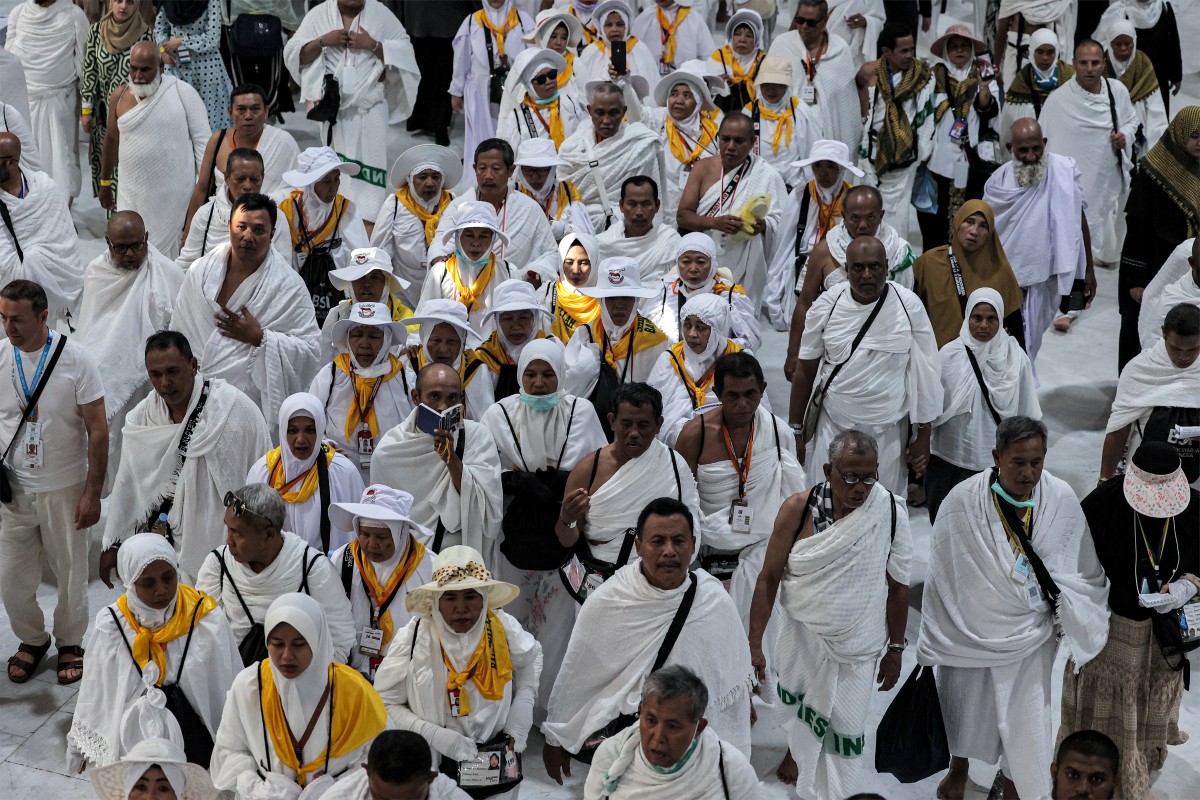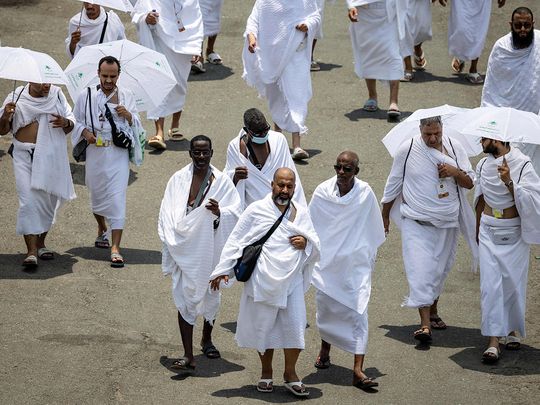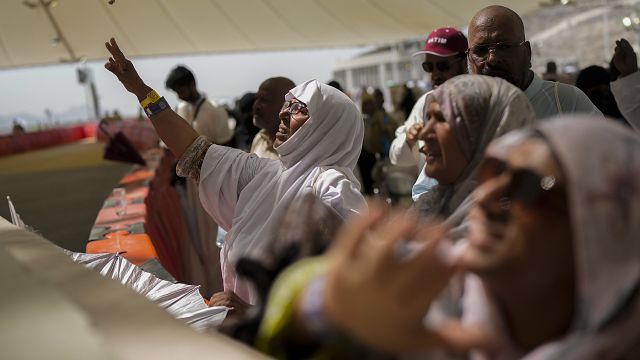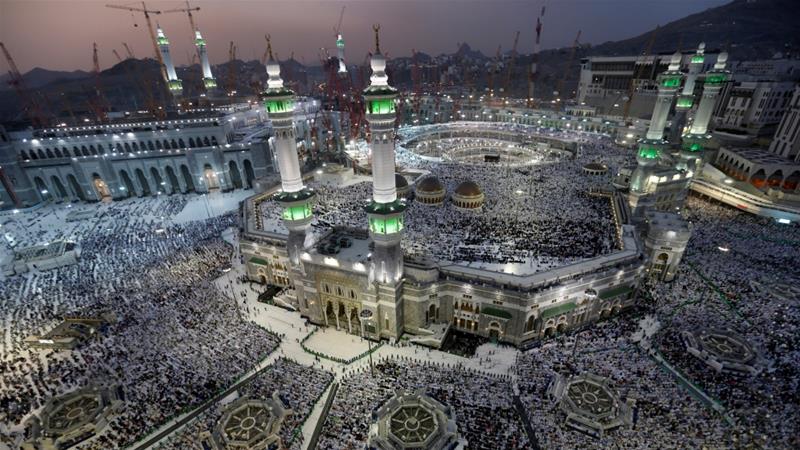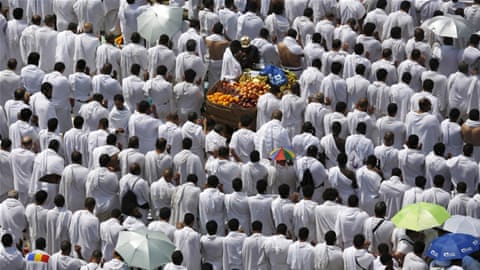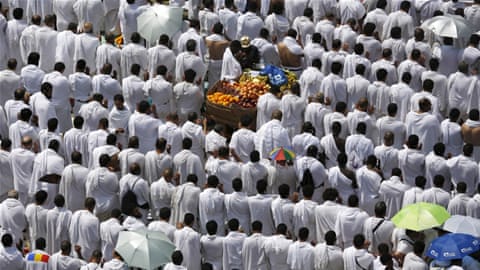The 2024 Hajj, intended as a time of reflection and devotion, turned into a battle against the elements for many pilgrims, GIFT HABIB reports
For millions of Muslims around the world, the Hajj pilgrimage to Mecca is more than just a religious obligation, it’s a spiritual journey of a lifetime, a chance to purify the soul and strengthen their faith.
This year, over 1.83 million pilgrims embarked on this sacred journey, including more than 1.6 million from 22 countries. Among these faithful were thousands of Nigerian pilgrims who faced an unexpected and brutal challenge: an unprecedented heat wave sweeping across Saudi Arabia.
You may be interested
The climate of Saudi Arabia is notorious for its intense heat, especially during the summer months when Hajj typically occurs. This year, temperatures soared above 45°C (113°F), transforming the pilgrimage from a deeply enriching experience into a hazardous endeavour.
The physically demanding rites of Hajj, which include long walks, circumambulation of the Kaaba, and the symbolic stoning of the devil at Jamarat, become even more strenuous and dangerous under such extreme conditions.
The pilgrimage has been a test of both physical endurance and spiritual fortitude. Stories of survival and solidarity have emerged, with pilgrims supporting one another through the gruelling journey.
For many pilgrims, particularly the elderly and those with preexisting health conditions, the heat has proven to be a formidable adversary. Among the Nigerian contingent, stories of perseverance and tragedy emerged, painting a vivid picture of the human cost of this year’s pilgrimage.
A respected leader of the All Progressives Congress in Lagos State, Alhaja Ramota Bankole, was one of the pilgrims making the journey. She had dreamed of this pilgrimage for years, saving diligently for the trip. However, the extreme heat took a heavy toll on her.
Despite the best efforts of those around her, Alhaja Ramota succumbed to heat stroke as reported by the AFP on June 20, 2024, becoming one of the over 1,000 pilgrims who died during the exercise.
Her story was not isolated. Many other Nigerian pilgrims faced similar fates. The Nigerian Hajj Commission reported several deaths and numerous cases of heat-related illnesses among its pilgrims. These tragedies highlighted the severe impact of the heat wave on those who undertook the pilgrimage.
The impact of the heat wave extends far beyond the Nigerian contingent. Pilgrims from Jordan, Tunisia, India, and Egypt also faced dire consequences. The Jordanian foreign ministry confirmed that 14 of its citizens died after suffering sunstroke. Tunisia and other countries reported multiple fatalities. Indian diplomats revealed that 68 Indians succumbed to the soaring temperatures, a stark reminder of the pilgrimage’s perilous nature this year.
One community in Saudi Arabia, visited by BBC reporters, lost more than 20 people due to the extreme heat. Egyptian authorities have faced challenges in determining official death tolls because many deceased pilgrims were not registered, adding to the complexity of the situation.
Heat-related illnesses, such as heat exhaustion and heat stroke, were major concerns during this year’s Hajj. The symptoms can range from mild dehydration and dizziness to severe organ failure and death, if not treated promptly. The infrastructure and medical support in place, though substantial, were sometimes overwhelmed by the sheer number of affected pilgrims.
In response, Saudi authorities implemented several measures to mitigate these risks. They directed pilgrims to avoid going to the Jamarat during the hottest parts of the day, between 11 am and 4 pm.
They set up cooling stations along pilgrimage routes, increased water availability, and placed medical teams strategically to offer immediate assistance. Awareness campaigns were launched to educate pilgrims about the dangers of heat-related illnesses and the importance of staying hydrated.
Despite these efforts, the sheer number of pilgrims poses a significant challenge. The Saudi authorities tried to remove hundreds of thousands of unregistered pilgrims from Mecca, however, many still participated in the hajj rites, which began on June 14, 2024. This group, unable to afford official permits, encountered significant difficulties due to the ongoing heat wave.
Each year, tens of thousands of pilgrims attempt to perform the hajj through unofficial channels, deterred by the high costs associated with official permits.
As a result, they lack access to the air-conditioned facilities provided for the 1.8 million authorised pilgrims, which are crucial for relief from the intense heat after hours of outdoor activities.
An Arab diplomat who spoke to AFP on June 20, 2024, highlighted the challenges faced by these pilgrims, noting their exhaustion after evading security forces before Arafat day. The day, marked by day-long outdoor prayers, signifies the climax of the hajj pilgrimage.
The Hajj attracts millions of participants, creating an environment of extreme overcrowding. This congestion made it difficult for pilgrims to access cooling stations and medical care promptly. During peak periods of the pilgrimage, such as the Tawaf (circumambulation of the Kaaba) and the stoning of the devil, the density became overwhelming.
Medical teams already stretched face immense pressure to attend to the needs of those suffering from heat-related illnesses. In some cases, pilgrims have had to wait for extended periods to receive medical attention, exacerbating their conditions. The intense physical demands of the Hajj rituals, combined with the oppressive heat, create a dangerous environment that can quickly turn fatal.
Amid this year’s Hajj pilgrimage, concerns over rising temperatures and their impact on pilgrim safety have come to the forefront. Stakeholders called for enforced adherence to heat-related protocols, public awareness, and leveraging of local resources to ensure the safety and well-being of all pilgrims.
A medical expert, Dr Francis Fagbule, noted that addressing the unique challenges posed by extreme weather conditions requires leveraging local resources.
Fagbule highlighted the importance of tailoring responses to the specific needs and resources of different regions.
“Different countries and communities face different challenges, and it is what is available in your locality that you will use to take care of them,” Fagbule explained.
He pointed to Saudi Arabia as an example, noting the particular difficulties posed by its desert environment.
He said, “Saudi is a desert, primarily. We know how severe the heat is in that area. The resources available to them there are different from, for example, northern Nigeria.”
The medical expert emphasised that local solutions were crucial in mitigating the effects of heat waves.
“What they need to do will depend on what is locally available, but one thing is key: the Saudi authorities need to have already informed the public about the potential harm or dangers associated with the heat wave.”
Public awareness, he noted, was vital to preventing heat-related deaths.
“If people are not aware that it can lead to death, then, of course, they need to be informed. Providing shelter is crucial. This helps to reduce the temperature as much as possible, creating a more conducive environment,” the medical expert added.
Fagbule’s insights underscore the necessity of localised strategies in effectively managing and mitigating the impacts of extreme weather conditions.
Another medical expert, Tunji Akintade, attributed the deaths of several pilgrims during the heat wave to their failure to adhere to established safety protocols.
According to Akintade, the pilgrims neglected crucial guidelines such as drinking plenty of water and consuming fruits to replenish electrolytes and, instead opted for sodas, which do not provide the necessary hydration.
“The pilgrims who died due to the heat wave did not follow the established protocols,” Akintade stated. “They needed to drink plenty of water and consume fruits to replace electrolytes. This is not the time to drink sodas.”
Akintade also noted that some pilgrims, particularly those from countries like Indonesia, have a strong preference for being buried in Saudi Arabia, driven by deep religious convictions. “Anything that has to do with religion, people do it dogmatically,” he added, suggesting that this mindset may have influenced their decisions during the heat wave.
An environmental analyst, Jakpor Philip, highlighted the severity of the situation, attributing the higher number of deaths to unusually hot weather, potentially exacerbated by global climate change.
“This year, the temperatures in Saudi Arabia are notably higher than usual,” Philip remarked, drawing attention to the Saudi government’s efforts to mitigate heat-related risks among pilgrims.
He praised initiatives promoting the use of umbrellas and ensuring adequate hydration but pointed out that these measures are not universally adhered to.
“There is a significant risk of heatstroke for pilgrims who do not follow these guidelines,” Philip cautioned. He called for stricter enforcement of safety protocols by Saudi authorities to safeguard the health of all participants.
“I think the Saudi Arabian government has done much to ensure that pilgrims are not affected by the heat stroke. I think one of the things the Saudi government is promoting is advising pilgrims to go with umbrellas and be adequately hydrated, which is taking a lot of water.
“Pilgrims are not forced to do that. So, a lot of pilgrims are exposed to heat stroke. So, what I think the Saudi government should do is to enforce it,” the environmental activist cautioned.
Beyond governmental measures, Philip emphasised individual responsibility, urging pilgrims to prioritise their health before embarking on the journey and to heed advice regarding hydration and sun protection.
“Ensuring good health and following these basic rules can go a long way in preventing heat-related illnesses,” he stressed.
The backdrop of global climate change adds urgency to these concerns, with Philip noting that rising temperatures globally necessitate proactive measures during large-scale events like the Hajj.
The plight of Nigerians and other pilgrims underscored the urgent need for adaptive measures in the face of a warming climate.
As global temperatures continue to rise, ensuring the safety and well-being of all pilgrims during Hajj must be a priority, requiring concerted efforts from Saudi authorities, international bodies, and the pilgrims themselves.

